英语人教版八年级下册过去进行时
- 格式:doc
- 大小:14.50 KB
- 文档页数:3
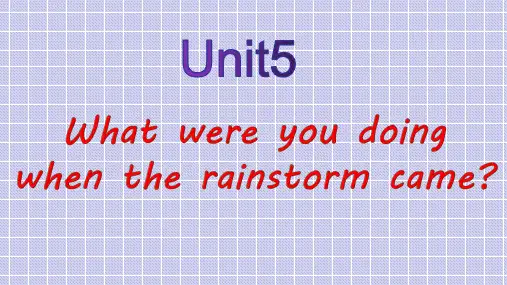
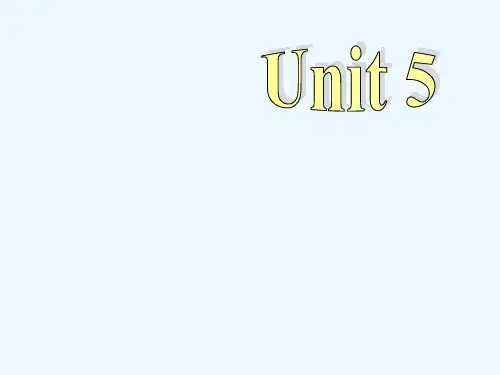
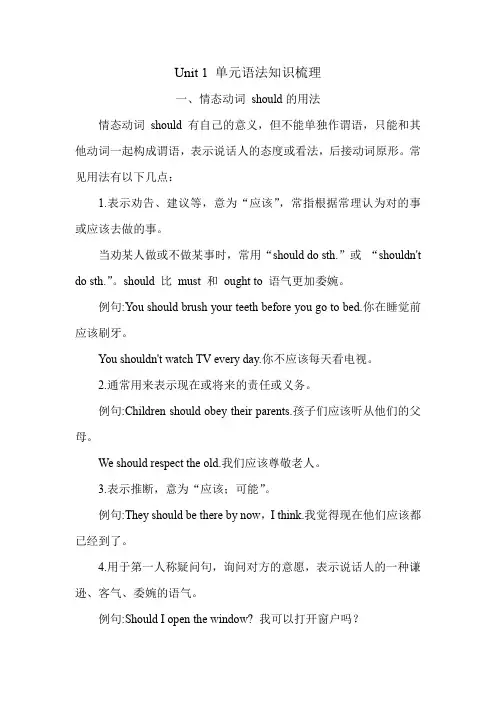
Unit 1 单元语法知识梳理一、情态动词should的用法情态动词should有自己的意义,但不能单独作谓语,只能和其他动词一起构成谓语,表示说话人的态度或看法,后接动词原形。
常见用法有以下几点:1.表示劝告、建议等,意为“应该”,常指根据常理认为对的事或应该去做的事。
当劝某人做或不做某事时,常用“should do sth.”或“shouldn't do sth.”。
should 比must 和ought to 语气更加委婉。
例句:You should brush your teeth before you go to bed.你在睡觉前应该刷牙。
You shouldn't watch TV every day.你不应该每天看电视。
2.通常用来表示现在或将来的责任或义务。
例句:Children should obey their parents.孩子们应该听从他们的父母。
We should respect the old.我们应该尊敬老人。
3.表示推断,意为“应该;可能”。
例句:They should be there by now,I think.我觉得现在他们应该都已经到了。
4.用于第一人称疑问句,询问对方的意愿,表示说话人的一种谦逊、客气、委婉的语气。
例句:Should I open the window? 我可以打开窗户吗?What should we do now? 我们现在该干什么呢?5.表示某种感情色彩,意为“竟会”,常用于以how, why开头引导的特殊疑问句中。
例句:Why should you be so early today? 你今天为什么会如此早?二、反身代词1.反身代词的构成反身代词是一种表示反射或强调的代词。
它由第一人称、第二人称的形容词性物主代词和第三人称代词的宾格加词尾-self或-selves构成。
其构成如下表:反身代词与它所指代的名词或代词形成互指关系,两者在人称和数上应保持一致。
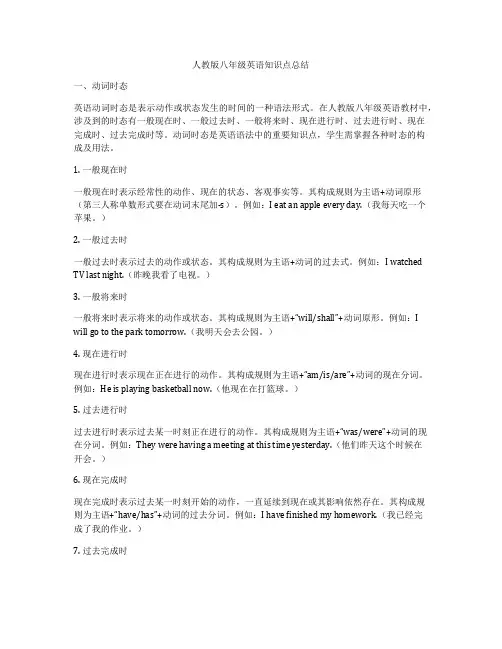
人教版八年级英语知识点总结一、动词时态英语动词时态是表示动作或状态发生的时间的一种语法形式。
在人教版八年级英语教材中,涉及到的时态有一般现在时、一般过去时、一般将来时、现在进行时、过去进行时、现在完成时、过去完成时等。
动词时态是英语语法中的重要知识点,学生需掌握各种时态的构成及用法。
1. 一般现在时一般现在时表示经常性的动作、现在的状态、客观事实等。
其构成规则为主语+动词原形(第三人称单数形式要在动词末尾加-s)。
例如:I eat an apple every day.(我每天吃一个苹果。
)2. 一般过去时一般过去时表示过去的动作或状态。
其构成规则为主语+动词的过去式。
例如:I watched TV last night.(昨晚我看了电视。
)3. 一般将来时一般将来时表示将来的动作或状态。
其构成规则为主语+“will/shall”+动词原形。
例如:I will go to the park tomorrow.(我明天会去公园。
)4. 现在进行时现在进行时表示现在正在进行的动作。
其构成规则为主语+“am/is/are”+动词的现在分词。
例如:He is playing basketball now.(他现在在打篮球。
)5. 过去进行时过去进行时表示过去某一时刻正在进行的动作。
其构成规则为主语+“was/were”+动词的现在分词。
例如:They were having a meeting at this time yesterday.(他们昨天这个时候在开会。
)6. 现在完成时现在完成时表示过去某一时刻开始的动作,一直延续到现在或其影响依然存在。
其构成规则为主语+“have/has”+动词的过去分词。
例如:I have finished my homework.(我已经完成了我的作业。
)7. 过去完成时过去完成时表示过去某一时刻之前已经发生的动作。
其构成规则为主语+“had”+动词的过去分词。
例如:She had gone to the park before I arrived.(我到达之前她已经去公园了。
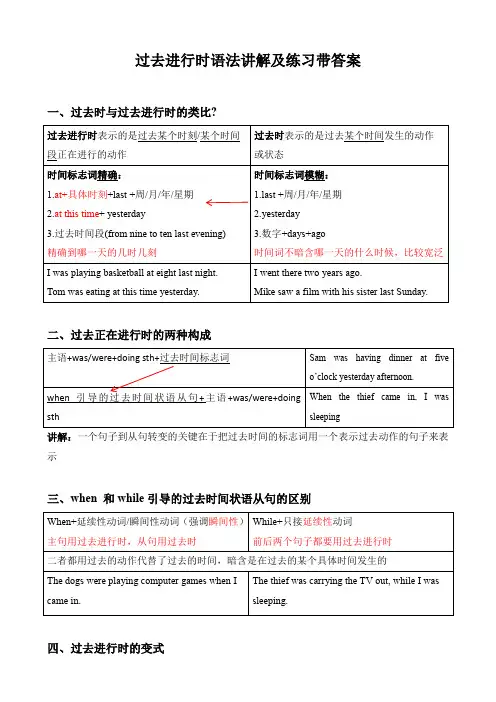
过去进行时语法讲解及练习带答案一、过去时与过去进行时的类比?二、过去正在进行时的两种构成讲解:一个句子到从句转变的关键在于把过去时间的标志词用一个表示过去动作的句子来表示三、when 和while引导的过去时间状语从句的区别一、用所给词的正确形式填空1.While I (watch) TV last night, my brother (read)a book.2.At six o 'clock last week, I (play)basketball.3.When I (open)the door, he (cough).4.While he (wait)for the bus last Monday, I (pass)by on my bike.5.____they___(have)a meeting at four yesterday afternoon?6.When I___(come)in the room,he didn’t___(see)me,for he___(read)something.7.At that time yesterday, I (lie)in bed.8.While Bob (play)in the park yesterday, his parents (clean)at home.9.When I was (walk)yesterday evening, I saw Tom (go)out with a bag10.Wendy (communicate)with her teacher after class yesterday11. When I (arrive)at the office last Wednesday, Sam (stand)in front of the office door.12.A strange box ___(arrive) while we __(talk).13. Father __ still ____(sleep) when I ___(get) up yesterday morning.14.When I opened the door at eight o 'clock in the afternoon yesterday , I saw my brother (push) my sister15.On a rainy day last month Lucy was (take)off on a plane to Paris二、选择用When/while填空1.We were reading the newspaper ____ the light went out.2.___ she was watching TV in the sitting room, the bell rang.3.She hurt herself ____ she was getting off the bus.4.____ he arrived, I was having a bath.5.___ I was playing games, my sister was doing her homework.6.Some people waste food, ____ others don’t have enough to eat.7.___ it began to rain, they were playing chess.( )1.When you me at eight o 'clock yesterday afternoon, I for my familyA.were calling ,cooked,B. called,cookingC. called, was cookingD. were calling,cooked( )2What did you yesterday afternoon while I dinner?A.did,was havingB.do,haveingC.were doing,was havingD.do,was having( )3.When I the flowers yesterday morning, it suddenly .A. watered, rainedB. was watering, was rainningC. watered, was rainningD. was watering, rained( )4.When we the exam last Friday, it suddenly rained heavilyA. were takingB. takeC.were takeingD. took( )5.What book ___ you ___ when I ___ you at four yesterday afternoon?A. did, read, was seeingB. did, read, sawC. were, reading, sawD. were, reading, was seeing( )6.When he in hospital last Tuesday, I in Beihai.A.was,traveledB. is,travelC. were,was travelingD. was,was traveling( )7.I the dishes when he on the doorA. washed, was knockingB. was washing, knockedC. washed, knockedD. was washing, was knocking( )8.A girl ____ my pen fall off the table when she ____ me.A. saw, passedB. was seeing, passedC. was seeing, passedD. was seeing, was passing( )9.We ____ for Tom at ten last Sunday. He often kept us ____.A. were waiting, waitingB. were waiting, waitC. waited, waitingD. waited, wait( )10.He to Paris between eight and nine last weekendA. was flyingB.flyC. fliedD. were flying( )11.What was Maria doing at 7 o’clock yesterday evening, Kangkang?She said that she _____ her room.A.cleaned B . is cleaning C. was cleaning .( )12.I called you yesterday evening, but no one answered.Sorry. I________a letter at that time.A. writeB. was writingC. is writing( )13.David, I called you this morning, but nobody answered the phone .I’m sorry. І______football with my friends then.A. playB. will playC. was playing( )14. Hi, Susan, I didn’t see you at the party.Oh, I ______for an English test.A. studiedB. am studyingC. was studying( )15.It was Friday evening.Mr and Mrs.Green_____ready to fly to England.A.are gettingB.getC.were gettingD.got( )16.They_____a football game from7to9last night.A.were watchingB.watchC.watchedD.are watching( )17.He____his father on the farm the whole afternoon last Saturday.A.helpsB.would helpC.was helpingD.is helping( )18.We____for Tom at ten last Sunday.He often kept us______.A.were waiting,waitingB.were waiting,waitC.waited,waitingD.waited,wait( )19.This time yesterday morning Jack_____his bike alone .He_____TV A.repaired,didn’t watch B.was repairing,watchedC.repaired,watchedD.was repairing,wasn’t watching( )20.I asleep yesterday afternoon while the doctor advice.A.fell,was givingB.fall,was givingC. was falling,givenD.fell,were giving参考答案括号内动词的正确形式填空。
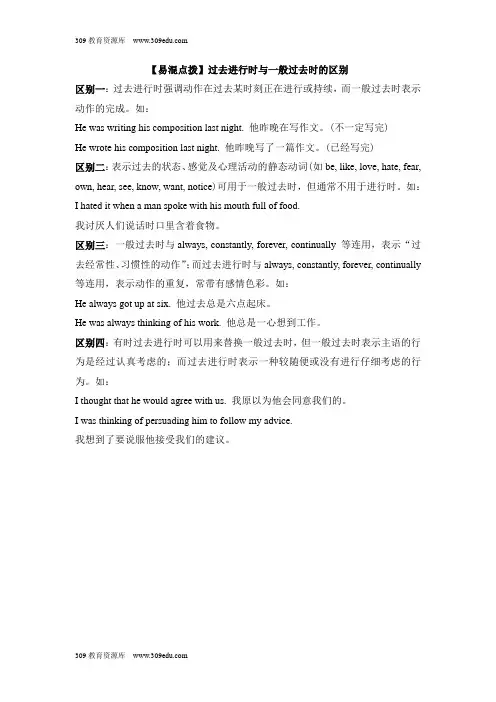
309教育资源库【易混点拨】过去进行时与一般过去时的区别区别一:过去进行时强调动作在过去某时刻正在进行或持续,而一般过去时表示动作的完成。
如:He was writing his composition last night. 他昨晚在写作文。
(不一定写完)He wrote his composition last night. 他昨晚写了一篇作文。
(已经写完)区别二:表示过去的状态、感觉及心理活动的静态动词(如be, like, love, hate, fear, own, hear, see, know, want, notice)可用于一般过去时,但通常不用于进行时。
如:I hated it when a man spoke with his mouth full of food.我讨厌人们说话时口里含着食物。
区别三:一般过去时与always, constantly, forever, continually 等连用,表示“过去经常性、习惯性的动作”;而过去进行时与always, constantly, forever, continually 等连用,表示动作的重复,常带有感情色彩。
如:He always got up at six. 他过去总是六点起床。
He was always thinking of his work. 他总是一心想到工作。
区别四:有时过去进行时可以用来替换一般过去时,但一般过去时表示主语的行为是经过认真考虑的;而过去进行时表示一种较随便或没有进行仔细考虑的行为。
如:I thought that he would agree with us. 我原以为他会同意我们的。
I was thinking of persuading him to follow my advice.我想到了要说服他接受我们的建议。
309教育资源库。
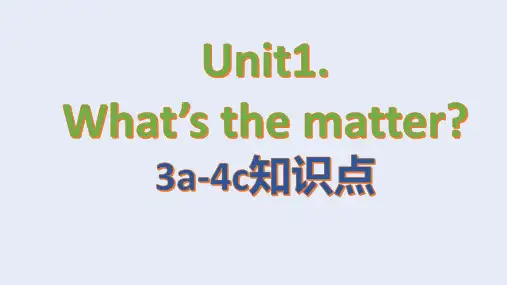
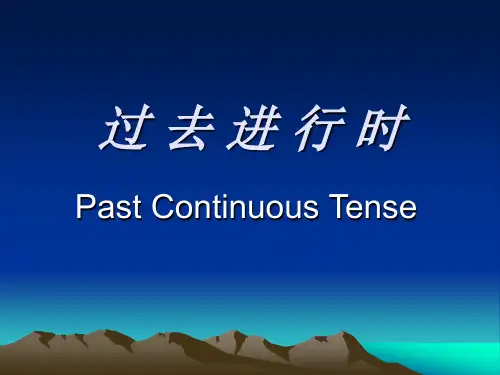
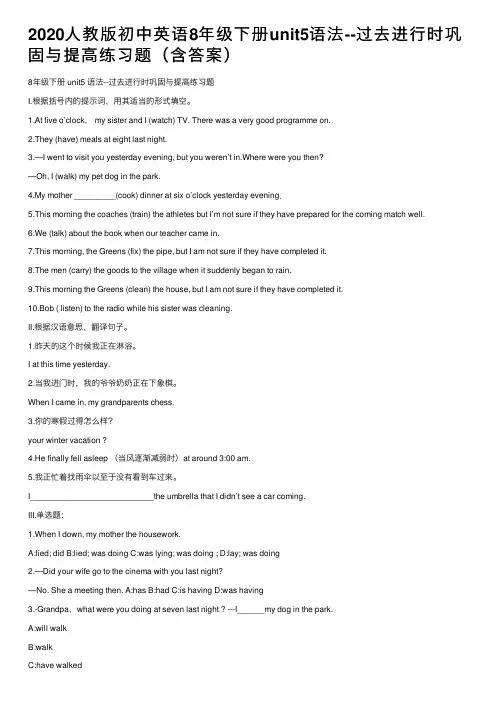
2020⼈教版初中英语8年级下册unit5语法--过去进⾏时巩固与提⾼练习题(含答案)8年级下册 unit5 语法--过去进⾏时巩固与提⾼练习题I.根据括号内的提⽰词,⽤其适当的形式填空。
1.At five o’clock, my sister and I (watch) TV. There was a very good programme on.2.They (have) meals at eight last night.3.—I went to visit you yesterday evening, but you weren’t in.Where were you then?—Oh, I (walk) my pet dog in the park.4.My mother _________(cook) dinner at six o’clock yesterday evening.5.This morning the coaches (train) the athletes but I’m not sure if they have prepared for the coming match well.6.We (talk) about the book when our teacher came in.7.This morning, the Greens (fix) the pipe, but I am not sure if they have completed it.8.The men (carry) the goods to the village when it suddenly began to rain.9.This morning the Greens (clean) the house, but I am not sure if they have completed it.10.Bob ( listen) to the radio while his sister was cleaning.II.根据汉语意思,翻译句⼦。
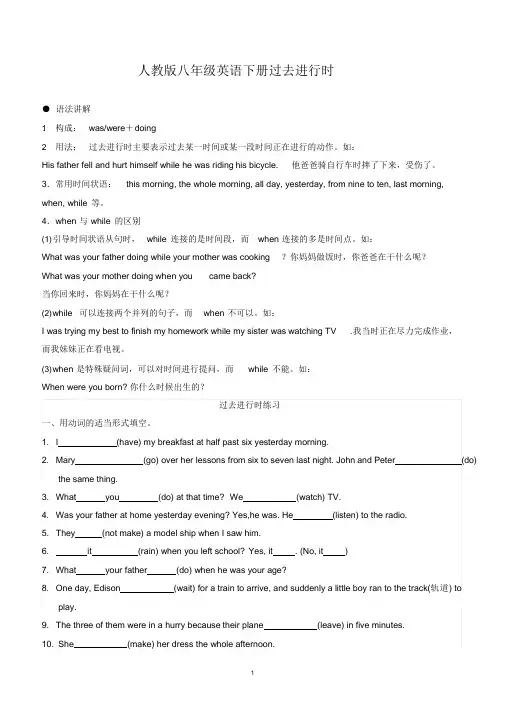
人教版八年级英语下册过去进行时●语法讲解1.构成:was/were+doing2.用法:过去进行时主要表示过去某一时间或某一段时间正在进行的动作。
如:His father fell and hurt himself while he was riding his bicycle. 他爸爸骑自行车时摔了下来,受伤了。
3.常用时间状语:this morning, the whole morning, all day, yesterday, from nine to ten, last morning, when, while 等。
4.when 与while 的区别(1) 引导时间状语从句时,while 连接的是时间段,而when 连接的多是时间点。
如:What was your father doing while your mother was cooking ?你妈妈做饭时,你爸爸在干什么呢?What was your mother doing when you came back?当你回来时,你妈妈在干什么呢?(2) w hile 可以连接两个并列的句子,而when 不可以。
如:I was trying my best to finish my homework while my sister was watching TV .我当时正在尽力完成作业,而我妹妹正在看电视。
(3) w hen 是特殊疑问词,可以对时间进行提问,而while 不能。
如:When were you born? 你什么时候出生的?过去进行时练习一、用动词的适当形式填空。
1. I (have) my breakfast at half past six yesterday morning.2. Mary (go) over her lessons from six to seven last night. John and Peter (do)the same thing.3. What you (do) at that time? We (watch) TV.4. Was your father at home yesterday evening? Yes,he was. He (listen) to the radio.5. They (not make) a model ship when I saw him.6. it (rain) when you left school? Yes, it . (No, it )7. What your father (do) when he was your age?8. One day, Edison (wait) for a train to arrive, and suddenly a little boy ran to the track(轨道) toplay.9. The three of them were in a hurry because their plane (leave) in five minutes.10. She (make) her dress the whole afternoon.11. While we (wait) for the bus, a girl (run) up to us.12. I (telephone) a friend when Bob (come) in.13. Jim (jump) on the bus as it (move) away.14. We (test) the new machine when the electricity (go) off.15. She (not want) to stay in bed while the others (all, work) in the fields.二、选择题1. I a meal when you me.A. cooked, were ringingB. was cooking, rangC. was cooking, were ringingD. cooked, rang2. He said he to draw a plane on the blackboard at that time.A. triesB. triedC. was tryingD. will try3. While she TV, she a sound outside the room.A. was watching, was hearingB. watched, was hearingC. watched, heardD. was watching, heard4. They a football game from 7 to 9 last night.A. were watchingB. watchC. watchedD. are watching5. What book you when I you at four yesterday afternoon?A. did, read, was seeingB. did, read, sawC. were, reading, sawD. were, reading, was seeing6. It was Friday evening. Mr and Mrs. Green ready to fly to England.A. are gettingB. getC. were gettingD. got7. Lei Feng always of others when he in the army.A. is, thinking, wasB. was, thinking, isC. did, think, isD. was, thinking, was8. A girl my pen fall off the table when she me.A. saw, passedB. was seeing, passedC. was seeing, pastD. was seeing, was passing9. We for Tom at ten last Sunday. He often kept us .A. were waiting, waitingB. were waiting, waitC. waited, waitingD. waited, wait10. He his father on the farm the whole afternoon last Saturday.A. helpsB. would helpC. was helpingD. is helping11. While mother some washing, I a kite for Kate.A. did, madeB. was doing, madeC. was doing, was makingD. did, was making12. “you angry then? The”y “too much noise. ”A. Are, were makingB. Were, were makingC. Are, madeD. Were, made13. He some cooking at that time, so he me.A. did, heardB. did, didn ’t hearC. was doing, heardD. was doing, didn ’t hear14. This time yesterday Jack his bike. He TVA. repaired, didn ’t watc B h. was repairing, watchedC. repaired, watchedD. was repairing, wasn watc’hin t g15. His parents wanted to know how he on with his new classmates.A. was gettingB. getsC. is gettingD. will get过去时中考真题Part 11. —What were you doing this time yesterday?—I on the grass and drawing a picture.A. sitB. satC. am sittingD. was sitting2. While I TV, the bell rang.A. watchB. watchedC. am watchingD. was watching3. —Why didn ’t you answer my telephone yesterday?—Sorry. I a bath.A. tookB. takeC. am takingD. was taking4. While the alien a souvenir, the girl called the police.A. was buyingB. boughtC. buysD. is buying5. —I called you at 6 o'clock yesterday evening, but nobody answered.— I'm sorry. I my friend download the movie Kung Fu PandaⅡwhen the telephone rang,A. would helpB. helpedC. was helping6. I along the road when I saw Peter. So we stopped and had a chat.A. walkedB. was walkingC. would walkD. had walked7. —What did the teacher say just now?— Sorry. I didn ’t catch it. I something else.A. thinkB. will thinkC. was thinkingD. had thought8. When I came back yesterday evening, my brother his homework.A is doing B. has done C. was doing9. M rs White dinner when her son came home.A. is cookingB. was cookingC. are cookingD. were cooking10. —D id you see Mr. Black just now?—Yes. He his car when I met him.A. parkedB. was parkingC. parksD. will park11. —Amy, I called you yesterday evening, but nobody answered the phone.— Oh, I a walk with my mother at that time.A. takeB. tookC. am takingD. was taking12. Y esterday evening, I along the street when I suddenly met my maths teacher.A. walkB. walkedC. was walkingD. am walking13.—Where were you at 7:00 last night?— I to my mom at home.A. writeB. was writingC. wrote14. —Why didn ’t you go to play football with us yesterday afternoon?—I my mother with the housework then.A. helpedB. was helpingC. had helpedD. have been helping15. He when the UFO arrived. He didn ’t wake until the UFO disappeared.A. sleptB. was sleepingC. was doing homeworkD. was singing16. I my homework at nine o'clock last Sunday morning.A. am doingB. was doingC. do17. I was very angry with John—he just when I spoke to him.A. isn ’t listeningB. hasn ’t listenedC. didn ’t listenD. wasn ’t listening18. —I called you at 4:00 yesterday afternoon, but no one answered.—Sorry, I with my friends at that time.A. swimB. swamC. will swimD. was swimming19. Mr. Li us a report on our environment when the earthquake happened in Japan.A. gaveB.is givingC. was giving20. —Mr. Lee to a student when I entered the classroom this morning.- He is very patient he is young.A. talking; butB. talks; thoughC. was talking, thoughD. talked, however21.—Were you at school when he came to see you?—Yes, I a math class.A. hadB. was havingC. am havingD. have22. I met a good friend of mine while I on the street.A. walksB. walkC. was walkingD. am walking23. I when the UFO landed.A. am watching TVB. was watching TVC. have watched TVD. watched TV24. The girl with two cats in the yard when the earthquake happened.A. was playingB. is playingC. are playingD. were playingPart 21. Paul and I tennis yesterday. He did much better than 1.A. playB. will playC. playedD. are playing2. A big party was held in NO.18 Middle School last night, the teacher with students singing and dancing happily at the party.A. isB. wasC. areD. were3. Mr. Black is going to marry a girl he in Japan last year.A. meetsB. metC. has metD. would meet4. He went into his room, the light and began to work.A. has turned onB. turned offC. turned onD. has turned off5.—W hat did Mr. Smith do before he came to China?—He in a car factory.A. worked B.works C.is working D.will work6. —Have you ever been to Hong Kong?—Yes, I ___there last month.A. went toB. have beenC. went7. This morning I had hardly got to my school when it to rain.A. had begunB. was beginningC. beganD. begins8.—Y ou have found your lost umbrella, haven ’t you?—Yes. I it behind the door this afternoon.A. have foundB. will findC. found9. Tom, along with three other boys, seen playing football a moment ago.A. isB. wasC. areD. were10. Ten minutes ago, there an eraser, a pen and some books on the desk.A. wasB. wereC. is11. —How was your trip to Hang Zhou, Jim?—Great! We to Xixi National Wetland Park.A. goB. am goingC. will goD. went12. –Do you know who cleaned the blackboard, Tina?-- Yes. John .A. doB. doesC. did13. The last time I to the cinema was two years ago.A. goB. have goneC. have beenD. went14. —Have you ever been to Canada?— Yes, I there last year with my parents.A. have beenB. have goneC. wentD. go15. I called you, but nobody answered. Where you?A. isB. areC. wasD. were16. ---Have you ever been to Shanghai?---Yes. I there a few months ago.A have been B. went C. have gone17. What’s the best present you have ever ?A. receivedB. receivesC. receiving18.—Lin Kai, hand in your homework, please.—Oh, sorry. I it at home this morning.A. was leavingB. has leftC. will leaveD. left19. I'm now in New York with my friend Jenny. We by plane on Monday.A. arriveB. arrivedC. are arrivingD. will arrive20.—Guess What! The great movie is on in the cinem.a一Nothing n ew.I it with my parents on the first day.A. saw B.see C.will see D. have been21. If it had been fine yesterday, we could have watched that air show. But it all day.A. has rainedB. had rainedC. rainedD. rains22. –When your mother you that blue dress, Lucy?–Sorry, I really can ’t rem M e a m ybert.wo or three weeks ago.A. will; buyB. does; buyC. did; buy23. -I ’v e got a ticket for the basketball game tonight.-Cool!How you it?A. had, gotB. did, getC. were, gettingD. will, get24. Hello! I'm very glad to see you. When you here?A. did; arriveB. will; arriveC. have; arrivedD. are; arriving25. —I have to be off right now.—What a pity! I you could stay a little longer with us.A. thinkB. am thinkingC. thought26. Tom was so careless that he his right arm when he was riding to school.A. hurtsB. hurtC. has hurtD. had hurt27. —I something wrong just now. May 1 use your eraser?—Of course. Here you are.A. writeB. wroteC. am writing过去进行时练习一、用动词的适当形式填空。
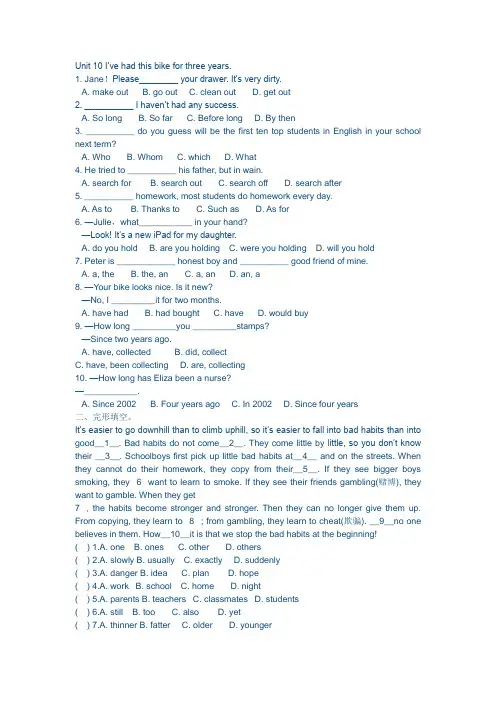
Unit 10 I’ve had this bike for three years.1. Jane!Please________ your drawer. It’s very dirty.A. make outB. go outC. clean outD. get out2. __________ I haven’t had any success.A. So longB. So farC. Before longD. By then3. __________ do you guess will be the first ten top students in English in your school next term?A. WhoB. WhomC. whichD. What4. He tried to __________ his father, but in wain.A. search forB. search outC. search offD. search after5. __________ homework, most students do homework every day.A. As toB. Thanks toC. Such asD. As for6. —Julie,what___________ in your hand?—Look! It’s a new iPad for my daughter.A. do you holdB. are you holdingC. were you holdingD. will you hold7. Peter is ____________ honest boy and __________ good friend of mine.A. a, theB. the, anC. a, anD. an, a8. —Your bike looks nice. Is it new?—No, I _________it for two months.A. have hadB. had boughtC. haveD. would buy9. —How long _________you _________stamps?—Since two years ago.A. have, collectedB. did, collectC. have, been collectingD. are, collecting10. —How long has Eliza been a nurse?—___________.A. Since 2002B. Four years agoC. In 2002D. Since four years二、完形填空。
人教版八年级下册英语Unit5知识点总结一、语法知识点A部分知识点1.过去进行时❶ 去进行时的构成及用法过去进行时由“助动词(was/were)+动词-ing”构成,表示在过去某一时刻或某一时间段正在进行的动作。
这一特定的过去时间除有上下文暗示以外,一般用过去的时间状语来表示。
如:then, at that time, at this time yesterday, at 10:00 yesterday morning, all right以及when/while从句等。
❶ 表示过去时间点正在进行的动作。
此时常伴明确的过去时间点等。
eg:She was reading a book at this time yesterday.昨天这个时候她正在看书。
(过去时间点正在进行的动作)I was watching TV then. 那时我正在看电视。
(过去时间点正在进行的动作)❶ 表示过去的某个阶段持续的动作。
eg:She was watching TV when the phone rang.(过去一段时间内持续的动作)她正在看电视,这时电话铃响了。
❶ 表示这一阶段反复发生的动作,带有褒贬感情色彩。
此时常伴有频度副词always等。
eg:The girl was always changing her mind.(过去反复发生的动作,带有感情色彩)这个女孩老是改变主意。
❶ 表示过去动作延迟到以后发生,即用过去进行表过去将来,此类动词是一些位置的变化的词。
eg:He told me that he was going soon.(过去进行表将来)他告诉我他很快就要走了。
❶ 过去进行时的一般疑问句句型:Be(Was/Were)+主语+现在分词+其他?肯定回答:Yes,主语+be(was/were).否定回答:No,主语+be(was/were) not.eg:--Were you cooking at that time? 那时,你在做饭吗?--Yes, I were.是的。
八年级英语下册Unit5语法练习班级考号姓名总分(过去进行时)一、用 when 或 while 填空。
1.My cousin came in we were watching TV.2. I arrived in Shanghai, it was already half past ten.3. I was reading, Mom fell asleep.4. she was reading the paper, he was cleaning the kitchen.5.It was raining we got off the bus yesterday morning.二、用括号中所给单词的适当形式填空。
1.When I (arrive)in Guangdong, it was dark.2.What you ( do)when your father came back?3.While my brother ( watch) the football match on TV, I was listening to musiC.4.Tom (read) a book at 8:00 last night.5.The children were busy ( clean) up the school.三、单项选择。
1. did the rainstorm come?- While we a physics lesson yesterday.A.When; have hadB.While; are havingC.When; were havingD.While; have2.- Hi, I didn't see you at John's birthday party last night.- Oh,I the book report at that time.A.prepared forB.prepare forC.am preparing forD.was preparing for3.Lucy her friends the whole morning, but they didn't show up.A.expectsB.will expectC.is expectingD.was expecting4.-Didn't you hear Dad call you?- No, I didn't.I with Jack on the phone.A.am talkingB.would talkC.have talkedD.was talking5.- Oh! What's wrong with your finger? - I hurt it while I a model plane.A.will makeB.was makingC.am makingD.make6.- I saw your light still on at 11 o'clock last night.- Oh,I an interesting talk show at that time.A.watchB.watchedC.am watchingD.was watching7.- I went to your home yesterday morning, but you weren't in.- Well, I along the river at that time.A.walkedB.was walkingC.am walkingD.have walked重难点1 sleepy 与sleep的用法1.Be quiet! The patients (sleep).2.(宿迁中考)Bob stayed up late last night and now he feels (sleep).3.Go to the sofa and have a good (sleep).重难点 2 pick up的用法1.(凉山中考)On my way home, my friend Bill came by in his car and picked me up.A.ran after meB.looked for meC.gave me a rideD.cheered me up2.吉姆!我的手机响了。
【语法详解】过去进行时一、过去进行时的定义过去进行时主要表示过去某一时刻正在进行的动作,或表示过去某一阶段一直在进行的动作。
如:I was having a talk with Li Hua at that time. 那时,我正在跟李华谈话。
I was watching TV at home last night. 昨晚我一直在看电视。
二、过去进行的构成过去进行时由“was / were + 现在分词”构成。
如:Someone is knocking the door. 有人在敲门。
Steam was rising from the coffee. 咖啡冒着热气。
Clouds were flying across the sky. 云彩飘过天空。
注意有些was (were) doing sth不是现在进行时,而是系表结构,其中的doing sth 是动名词,不是现在分词。
如:Her job was washing clothes. 她的工作是洗衣裳。
Her hobby was growing roses. 她的爱好是种植玫瑰。
Her suggestion was having our conversation in French. 她的建议是我们用法语交谈。
三、过去进行时的主要用法1. 表示在过去某一点时间或某一段时正在进行的动作。
如:I was having a bath when the phone rang. 我正在洗澡,突然电话铃响了。
She was writing letters. I didn’t want to disturb her. 她在写信。
我不想打扰她。
2. 表示在过去短期内正在进行的动作或存在的情况,这种情况通常不会长期如此。
如:It happened while I was living in Eastboume last year. 这件事发生于去年我住在伊斯特本的时候。
Unit 5 What were you doing when the rainstorm came?Section A1. What were people doing yesterday at the time of the rainstorm.1) 本句为过去进行时态,表示在过去某时间某动作正在发生,由“助动词was/were+v.-ing ”。
--- What were you doing at nine yesterday morning?---I was playing in the park.2) at the time of 在 .... 的时候What were you doing at the time of the earthquake.2. My alarm didn ' t go off so I ________ up late.Go off 意为”(闹钟)发出响声The alarm went off at 6:30.A car alarm went off in the middle of the night.3. I ____ to the bus stop but I still missed the bus.我________ 到公共汽车候车亭,但我还是没赶上公共汽车。
Hurry up, or you will miss your train.I got up late so I missed the early bus.拓展:1) miss 作及物动词,意为“想念、思念”2) miss 作及物动词,意为“缺课”4. 。
When the rainstorm suddenly came, what were you doing?1) 此处when 作从属连词,意为“当。
时候”,引导时间状语从句,其谓语动词既可以是非延续性动词,也可以是延续性动词,谓语动词动作发生的时间可以与主句的谓语动词的动作是同时、之前后之后。
一、教学设计:
知识与技能
1、学习初中阶段的一个重要的时态“过去进行时”。
2、用过去进行时编写对话。
3、学习课文中的知识点。
过程与方法
1、通过小组合作,兵教兵的形式学习过去进行时。
2、通过PK的形式高效学习对话。
3、在学习的过程中,教师发现易错点,加强巩固。
情感、态度和价值观
1、通过PK,培养学生学习兴趣,激发学生的求知欲。
2、通过小组合作的形式让学生学会分享,学会竞争。
二、学情分析:
初中生的学习心理特点:(1)兴趣:对英语普遍感兴趣,但有很大的不稳定性,好奇心强,求知欲旺盛,已不满足教师对课文的简单重复。
(2)记忆:对刺激记忆手段多的知识记忆深刻,遵从记忆规律。
(3)思维:偏重于形象思维,对片面,零碎的材料尚缺乏一定的概括分析能力。
(4)评价:主要通过他人评价初步形成对自己的评价,所以很在乎他人的评价;自我认识较模糊、片面,但自我意识却不断增强。
因此,在本学科的教学过程中,在注重启发引导,培养学生分析、概括能力的同时,更要注重教学方法的灵活性,通过“三模六步”教学法,情景交际法,激发学
生学习的兴趣,让学生乐于接受,易于接受。
三、重点和难点:
本堂课的内容主要分为两部分
重点:过去进行时态和课文中出现知识点中的易错点
难点:过去进行时态的应用
四、教学新设计
教学方法:“三模六步法”。
学习方法:自主学习合作探究展示的学习方式。
三模块:自主体验、合作探究、展示反馈
五、教学流程
1.导入
教师以一个现场歌唱的视频导入,导出what were you doing when I listened to music?是本节课的语法句型,过去进行时。
策略:通过视频吸引学生的眼球,既让学生进入状态,又让学生初步了解本节课的语法。
2.合作交流
以小组合作的形式对本语法的知识进行梳理,归纳总结,同时发现问题,确定重难点。
策略:在这一环节,通过学生的亲身体验和主动参与来完成,学生们通过小组合作共同探讨,解决共性问题。
3. 汇报展示
让一名学生当小老师,四名学生板书,下面的学生说出重难点,易错
点,并针对以上内容举一反三,发复训练。
真正达到查漏补缺的目的。
策略:学生随时质疑,师生互动,生生互动,师生共同唱一台戏。
4.巩固运用
通过这一pk活动设计,不仅仅是活跃了课堂气氛,更重要是在活动中运用知识,熟练的掌握本节课的重点语法和句型。
策略:让学生在竞争中学到更多的相关知识。
5. 拓展提升
以链接中考的形式拓展延伸,总结规律和做题方法,拓展知识,丰富知识。
策略:让更高一个层度的学生有更大的收获。
6.当堂检测。
针对重难点、易错点。
教师准备了检测题。
我们坚决反对多做题才是复习的错误观点,每一道习题都是经过精挑细选。
策略:通过当堂检测让学生和老师都能了解学生的掌握情况。
7.作业
通过作业,进一步了解学生的掌握情况,让学生更自信的学习英语。